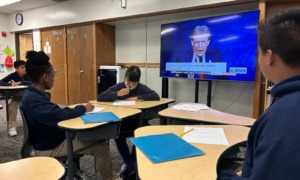The one-year anniversary of the signing of the Edward M. Kennedy Serve America Act brought officials of major service organization to Washington for a day of discussion of how to transform service from a type of “goodwill” to outcomes that affect national problems and can be measured.
Shirley Sagawa, whose latest book “The American Way to Change” addresses the same topic, began the discourse at a program held by the Center for American Progress, outlining ways that volunteers and service agencies are addressing some of the country’s basic problems, especially unemployment.
While members of programs such as AmeriCorps provide tutoring and mentoring in some of the country’s toughest neighborhoods, they also learn skills that will serve them well in later employment, Sagawa said. And some AmeriCorps programs – such as the Teach for America and the Community Health Corps – offer lead directly to full-time careers.
The role of volunteers, Sagawa said, needs to shift from “nice to necessary” and the work they do “needs to focus more on results,” by “tracking whether they made progress.”
Sagawa’s comments are in tune with President Barack Obama’s emphasis on “evidence-based” results as a basis for determining where scarce federal dollars should be spent. He has sought to eliminate programs that haven’t shown their effectiveness –such as his efforts to end abstinence-only education (though Congress made some of the funding available). Obama also wants to require groups that previously had line-items in the budget, including Teach for America and Reading Is Fundamental, to compete with similar groups for federal funding.
Jason Patnosh, executive director of the Community HealthCorps, and Lester Strong, CEO of Experience Corps (which engages persons 55 and older), joined Sagawa on a panel moderated by Stacy Palmer, editor of The Chronicle of Philanthropy. They addressed how to recruit volunteers – “Ask them,” Sagawa said – and how to keep them engaged – give them a job description, make them apply, provide an expected period of service and treat them like employees, Strong said.
Patnosh said that the passage of health care reform will require even more people to reach out to people in the communities who had not had insurance and to educate patients so they can follow through on their doctor’s instructions and manage their health care.
Another gathering celebrating the anniversary was held later in the day by Service Nation. The Corporation for National and Community Service’s recently confirmed CEO, Patrick Corvington, delivered the keynote, in which he set out four goals for the corporation to fulfill the objectives of the Kennedy Act:
- To make service a solution to national challenges such as historic unemployment levels and poverty;
- To expand opportunities for more Americans of all ages and backgrounds to serve;
- To build the capacity of individuals, nonprofits, corporations and communities by giving them the tools they needs to succeed; and
- To embrace innovation by expanding proven programs and seeding promising emerging ones.
Under the Kennedy Act, CNCS’ AmeriCorps is authorized to expand from the approximately 75,000 members at the time the legislation was passed to 250,000 members by 2017.
“We must not only try, we must succeed. In fulfilling the promise of the Serve America Act America Act, we must transform service from a hope and a dream to a real solution,” Corvington said.
Click here to read Corvington’s entire speech.




























